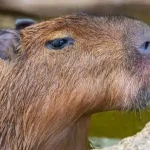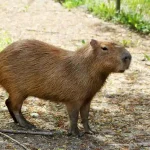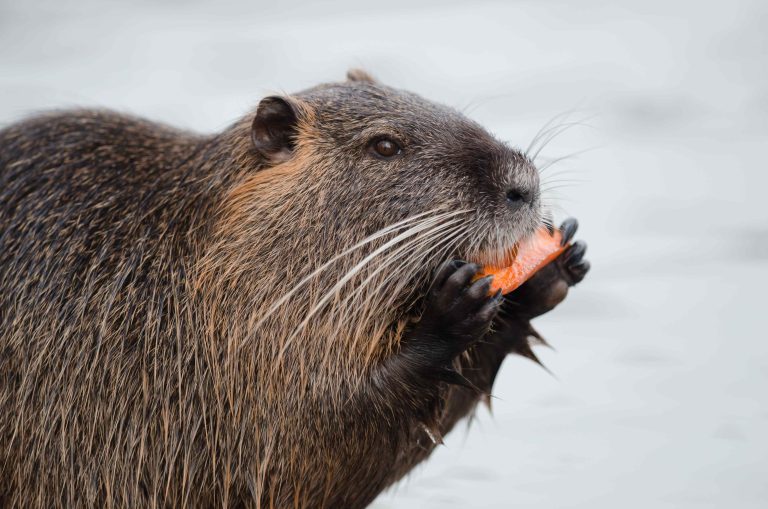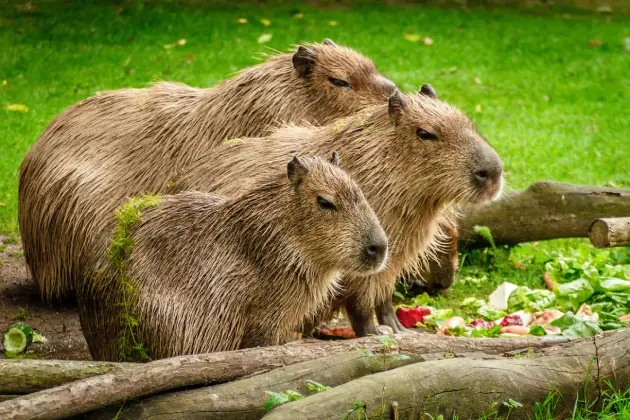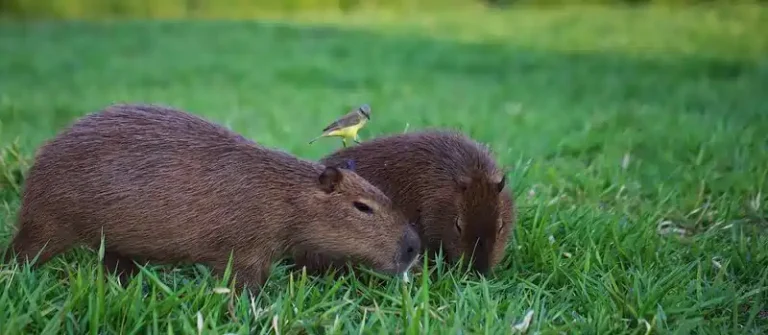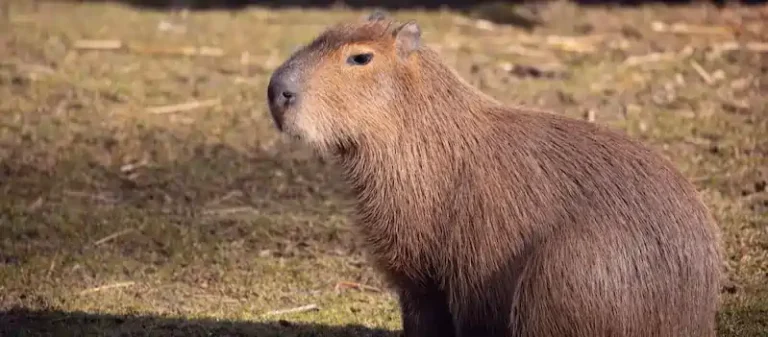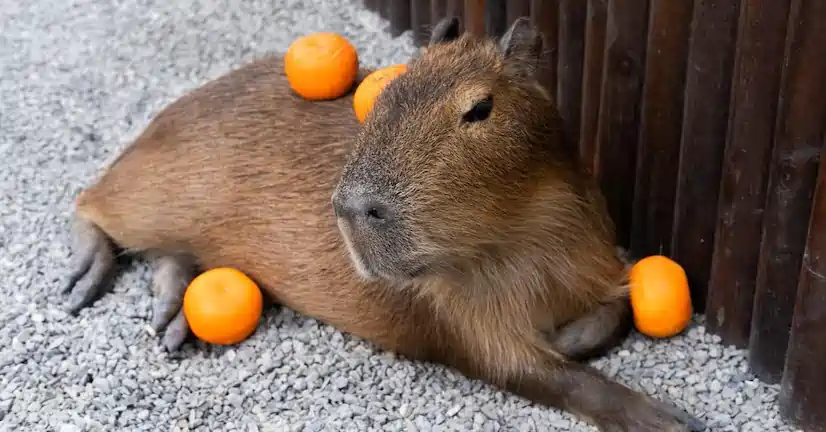
When you think of delightful and quirky animals, capybaras are likely at the top of the list. These gentle giants, known for their friendly demeanor and sociable nature, have captured the hearts of animal lovers worldwide. But what is it about these adorable creatures that makes them go giddy over a simple orange? Is it the bright color, the juicy sweetness, or perhaps something deeper in their dietary preferences? Join us on this zesty journey as we peel back the layers to uncover why capybaras are so enamored with oranges. From nutritional benefits to playful antics, get ready to discover how this citrus sensation plays a pivotal role in their lives!
Introduction to Capybaras
Capybaras, the gentle giants of the rodent world, have captured hearts and minds with their adorable looks and laid-back demeanor. Often seen lounging by water bodies in their native South American habitats, these social creatures thrive in groups and enjoy a variety of foods. But among all their culinary delights, one fruit seems to reign supreme: the orange! With vibrant colors and a refreshing zest, oranges seem to hold a special place in the capybara diet. So what is it about this citrus wonder that makes capybaras go wild? Let’s dive into the fascinating connection between these charming rodents and their beloved oranges!
Brief overview of their appearance and behavior
Capybaras are the largest rodents in the world, boasting a stocky body that can weigh between 77 to 146 pounds. Their short legs and webbed feet make them exceptional swimmers, perfectly adapted for their aquatic habitats. With coarse brown fur and slightly rounded faces, they possess an endearing appearance. Their large eyes are set high on their heads, allowing them to spot predators while mostly submerged in water. Social creatures by nature, capybaras live in groups ranging from ten to twenty individuals. They communicate through various sounds like barks, whistles, and purrs. These gentle giants exhibit calm behavior and often engage in playful activities with one another. Known for their herbivorous diet, capybaras thrive on grasses but will indulge occasionally in fruits like oranges when offered.

Why do Capybaras like Oranges?
Capybaras are herbivores, primarily munching on grasses and aquatic plants. Their diet is rich in fiber, which helps maintain their digestive health. However, they often show a quirky preference for fruits like oranges. Vitamin C plays a crucial role in their nutrition. Just like humans, capybaras need this vitamin to boost their immune system and promote overall well-being. Oranges provide a tasty source of this essential nutrient. One could speculate that the vibrant color and sweet aroma of oranges attract these gentle giants. Their curious nature leads them to explore new foods enthusiastically, making citrus fruits an exciting treat. The juicy texture also adds an element of fun during feeding time. Watching a capybara tackle an orange can be quite entertaining, showcasing its playful side as it nibbles away.
Explanation of their natural diet
Capybaras are fascinating creatures with a natural diet primarily consisting of grasses, aquatic plants, and fruits. These gentle giants thrive in semi-aquatic environments like rivers and wetlands, where their food sources abound. Being herbivores, they spend much of their day grazing. Their teeth are perfectly designed for grinding tough plant materials. This adaptation helps them extract maximum nutrients from fibrous foods. In the wild, capybaras also enjoy a variety of fruits when available. They exhibit curious eating habits and often sample new items as they come across them. While grasses form the bulk of their meals, fruits provide essential vitamins that contribute to their overall health. Their preference for fresh vegetation highlights their adaptability as foragers within diverse ecosystems. The hunt for tasty treats keeps life interesting in the grasslands or near water bodies where they roam freely.
The role of Vitamin C in their diet
Vitamin C plays a vital role in the diet of capybaras. This nutrient is crucial for their overall health, aiding in immune function and helping to fend off infections. Capybaras are not able to synthesize Vitamin C on their own, which makes dietary sources essential. Oranges are an excellent option due to their high content of this important vitamin. The consumption of oranges provides a tasty treat while delivering necessary nutrients. The fruit’s sweetness likely adds to its allure, making it an irresistible snack for these large rodents. Additionally, Vitamin C contributes to collagen production. This protein is important for maintaining healthy skin and connective tissues in capybaras as they grow and age. Incorporating fruits like oranges into their diet helps ensure that these social animals stay healthy and vibrant throughout their lives.
Possible reasons for their love for oranges
Capybaras are known for their curious and playful nature. One possible reason they adore oranges could be the fruit’s bright color and appealing scent. These sensory attributes catch their attention, drawing them in for a taste. Another factor may lie in the sweetness of oranges. Capybaras have a natural inclination towards sugary foods, which makes citrus fruits an irresistible treat. The juicy texture adds to the overall enjoyment when they munch on these vibrant snacks. Additionally, capybaras are social creatures that often share food with one another. When they see their companions enjoying an orange, it can spark curiosity and encourage them to try it too. This shared experience further solidifies their fondness for this tangy delight. Lastly, as herbivores, capybaras instinctively seek out fruits high in water content to stay hydrated — a characteristic that fresh oranges provide exceptionally well.
Fun Facts about Capybaras and Oranges
Capybaras have a fascinating relationship with oranges that goes beyond mere snack time. These social animals often show excitement at the sight of this citrus fruit, making it a delightful treat during feeding sessions. When capybaras munch on oranges, they employ their strong front teeth to break through the tough skin. It’s quite a sight as they savor each juicy segment with enthusiasm. In captivity, you might find them sharing an orange with their friends. This behavior showcases their friendly nature and love for communal eating experiences. Observing capybaras interact over food can reveal much about their social structures. Interestingly, these large rodents are known not just for enjoying fresh fruit but also for being selective eaters. They tend to gravitate toward foods that offer both taste and nutritional value, making oranges an ideal fit in their diet!
Interesting observations and behaviors related to their love for oranges
Capybaras have a fascinating relationship with oranges that goes beyond mere munching. Observers often note their playful antics when offered this citrus treat. They may roll the fruit around, nudging it with their noses before taking a bite. When capybaras enjoy oranges, they exhibit signs of genuine delight. Their eyes light up, and you can hear soft chattering sounds as they savor each slice. It’s almost like watching a child with candy for the first time. These social creatures also share their orange bounty with friends in groups, showing off how much they love these fruits. This sharing behavior highlights their strong social bonds within family units or herds. Interestingly, some capybaras show preferences for specific types of oranges, sniffing them out before choosing which to nibble on first. Each capybara seems to have its own unique ritual when enjoying this tasty snack!
How capybaras consume oranges
Capybaras have a unique approach when it comes to enjoying their favorite citrus fruit. They often hold oranges with their front paws, showcasing their dexterity. This behavior is fascinating to observe. Once they grasp the orange, they use their strong teeth to break through the skin. The juicy segments inside are what they crave most. As they chew, you can see them savoring each bite, relishing the sweet and tangy flavor. These social animals sometimes share their treats with friends in the group. Watching a capybara pass an orange around adds a delightful touch to these moments of connection. Interestingly, capybaras don’t just consume whole oranges; they also enjoy smaller pieces if offered by caretakers or in captivity. Each method showcases how adaptable and resourceful these creatures are when it comes to satisfying their snack time cravings.
The Benefits of Eating Oranges for Capybaras
Oranges are not just a delightful snack for capybaras; they also pack a nutritional punch. Rich in Vitamin C, these juicy fruits play a vital role in boosting their immune systems. Healthy immunity is crucial for these social creatures, especially when living in groups. The hydration factor can’t be overlooked either. Oranges contain high water content, helping capybaras stay hydrated during hot days. This is essential since they often inhabit warm climates. Moreover, the natural sugars found in oranges provide an energy boost that keeps them active and playful throughout the day. These tasty treats can support their overall health while satisfying their cravings. Lastly, munching on oranges can promote good dental hygiene due to the fibrous texture of the fruit. Chewing through this citrus delight helps wear down any plaque buildup on their teeth naturally.
Nutritional benefits of oranges for capybaras
Oranges are a delightful treat for capybaras, packed with essential nutrients. They’re an excellent source of Vitamin C, which plays a crucial role in boosting the immune system. This vitamin helps prevent illnesses and supports overall health. In addition to Vitamin C, oranges provide dietary fiber. This is beneficial for digestion, ensuring that capybaras can process their food effectively. Healthy digestion contributes to better well-being and energy levels. Moreover, oranges contain antioxidants that combat free radicals in the body. These compounds help protect cells from damage and may reduce the risk of chronic diseases. The hydration factor is another perk; oranges have high water content, keeping capybaras hydrated on warm days. They enjoy nibbling on juicy orange slices as a refreshing snack during playtime or relaxation by the water’s edge.
Health benefits associated with a Vitamin C-rich diet
Vitamin C is a powerhouse nutrient, essential for maintaining overall health. For capybaras, consuming foods rich in this vitamin supports their immune system and helps fend off infections. Additionally, Vitamin C plays a critical role in collagen production. This protein is vital for healthy skin and connective tissues. A strong structure keeps capybara bodies flexible and resilient. Antioxidant properties are another benefit of Vitamin C. These compounds help neutralize free radicals in the body, reducing oxidative stress and promoting longevity. Moreover, high levels of Vitamin C can assist with iron absorption from plant-based foods they consume daily. Improved iron intake contributes to better energy levels for these adorable rodents as they navigate their habitats. Cumulatively, all these benefits contribute significantly to the well-being of capybaras enjoying their favorite orange treat while thriving in their natural environments.
Other Foods Capybaras Enjoy
Capybaras are curious creatures with a varied palate. While oranges capture their attention, they enjoy a diverse diet that keeps them healthy and happy. Grass is a staple food for these gentle giants. They graze on different varieties, finding nourishment in the lush greenery around them. Their herbivorous nature means they thrive on plant-based diets. In addition to grass, capybaras love vegetables like carrots and sweet potatoes. These crunchy treats provide essential nutrients while adding some excitement to mealtime. Fruits also make frequent appearances in their diet. Bananas, apples, and watermelon often delight capybaras during snack time. Each fruit offers unique flavors and textures that keep things interesting. Lastly, leafy greens such as lettuce or spinach are favorites too! Capybaras will happily munch through these nutrient-rich options whenever available.
A brief overview
Capybaras are known for their friendly and social nature. They thrive in groups and have a herbivorous diet, primarily consisting of grasses, aquatic plants, and fruits. Their ability to adapt to different environments plays a crucial role in their dietary choices. In addition to oranges, capybaras enjoy other fruits like melons and berries. Vegetables such as carrots and leafy greens also make up a significant part of their meals. This varied diet contributes to their health and well-being. Their love for oranges stands out among the rest due to the sweetness and juiciness that these citrus fruits offer. Observing capybaras interact with oranges is truly delightful; they often chew them eagerly or roll them around playfully before indulging. The fascination people have with these gentle giants continues to grow, especially when it comes to sharing unique foods like oranges with them. If you ever get the chance to see a capybara enjoying an orange, it’s an experience you won’t forget!
Frequently Asked Questions (FAQs) about Capybaras and Oranges
Do capybaras really like oranges?
Yes, they do! In fact, oranges are one of the favorite snacks of these unique creatures. They have a sweet tooth and are often attracted to the citrus smell of oranges.
Is it safe for capybaras to eat oranges?
Yes, it is safe for them to eat oranges in moderation. Oranges provide a good source of Vitamin C for capybaras, just like they do for humans. However, too much citrus can cause stomach upset in these animals.
Can I feed wild capybaras with oranges?
It is not recommended to feed wild capybaras with any type of food, including oranges. These animals have specific diets that are carefully balanced by nature, and introducing new foods can disrupt their digestive system and lead to health issues.
Are there any other fruits that capybaras enjoy?
Capybaras also enjoy other fruits such as bananas, apples, grapes, and watermelon. However, as with oranges, these should be given in moderation as treats rather than main meals.
How often should I give my pet capybara an orange?
A small wedge or slice of orange once or twice a week is sufficient for a pet capybara’s diet. It is important not to overfeed them with citrus fruits as it can cause digestive problems.
Can baby capybaras also eat oranges?
Baby capybaras can start eating solid food at around two weeks old but should still primarily rely on their mother’s milk until they are three months old. At this stage, it is best to avoid giving them acidic fruits like oranges until they are fully weaned from their mother’s milk.

